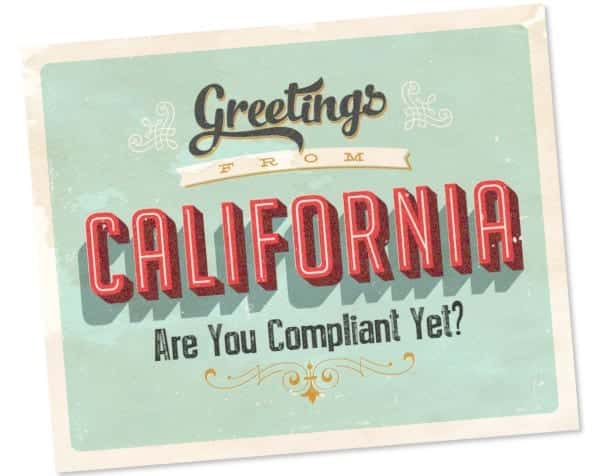How can you keep compliant with CCPA?
The California Consumer Privacy Act can impact you even if you’re not doing business with the state.
As the fifth-biggest economy in the world, California is a vital market for many enterprises. Its new data protection regulation may affect them even if they don’t conduct business strictly within its borders, however.
The complexities of CCPA compliance require automation and technology solutions to accurately maintain compliance, since traditional approaches are inadequate to its demands.

How can technology help with CCPA compliance?
Under the CCPA, a marketer is expected to follow its personal information protection clauses even if they aren’t physically located in California, or are doing business with a citizen who’s located there. If they’re collecting personal data from a Californian who is outside the state lines, the company is still liable.
The penalties for non-compliance can be severe, especially since they’re assessed on a per-PII-file basis. To cope with that, new technologies are demanded to automate compliance and embed data privacy best practices in your operations.
A complex and ever-shifting scenario
Like the GDPR, the CCPA’s mandates are well-known, and many enterprises have put tools in place to meet them. But the data privacy landscape for any company can shift quickly when regulations are modified, or new channels are added where data capture is a possibility.
To stay compliant with the CCPA, it’s incumbent on risk managers to keep policies and procedures up to date, to communicate those policies and capture attestations, to manage the data already on hand, and take control of informal End User Computing (EUC) applications, typically spreadsheets, that contribute to core processes.
What technologies can meet these needs?
- A policy management solution can streamline and automate each step of the policies and procedures process, making it far easier to create and deploy policies – and show regulators you’ve got a defensible program in place.
- An enterprise content management (ECM) tool can collect, secure, and analyze data and documents from across the whole company, and properly delete data at its expiry date.
- And an EUC management solution can discover, monitor, and risk-assess the spreadsheets and other “hidden” assets that are probably essential to everyday operations, but are outside of IT control.
These are building blocks of a technology set to meet the needs of the CCPA, and the other data privacy regulations springing up in more and more jurisdictions.
Solutions
The complexities of dealing with the CCPA have made manual processes and tools obsolete. To cost-effectively mitigate potential risk and exposure, companies are leveraging state-of-the-art legal and GRC software solutions.
Policy Management
A policy management solution like Mitratech’s PolicyHub saves time and improves efficiency, supporting effective policy management by automating and streamlining the processes involved, and removing the complexities and errors involved. So you can build an ethical and defensible compliance program.
Enterprise Content Management
An ECM solution provides complete control over the capture, indexing, archival, retrieval, accessibility, delivery and retention of every item of business-critical information in an organization, via a secure central repository. For financial services firms who have to scrupulously manage personal data, this is especially vital.
EUC/Shadow IT Management
An automated tool like ClusterSeven lets you proactively discover, monitor, review, and audit changes made to End User Application spreadsheets and other “Shadow IT” data assets hidden across your enterprise. Gain a centralized view of enterprise-wide critical spreadsheet use, assess and prioritize critical spreadsheets, and provide transparency for management and auditors about your most important files.
Compliance & Obligations Management
A compliance and obligations management solution, like Mitratech’s CMO offering, uses a simple, intuitive interface to let employees and auditors be proactive in incident and audit management, including regulatory obligations, controls, investigations, and non-conformance reporting. Easily report incidents, understand your obligations, and continuously improve your compliance performance.

